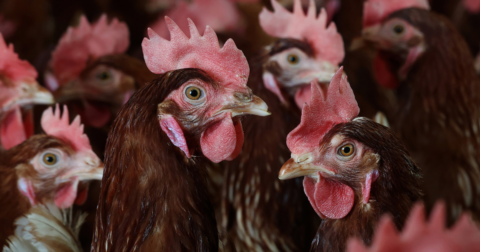News
Republicans’ New Farm Bill Takes Aim at Animal Welfare and Pesticide Regulations
Policy•8 min read
News
The administration says animal welfare laws in California are raising egg prices nationwide.


Words by Seth Millstein
Last week, the Trump administration announced it filed a lawsuit against California over its animal welfare laws. The administration claims that the state’s welfare protections, which include Proposition 12, have caused egg prices to skyrocket nationwide. The lawsuit targets three laws in the Golden State aimed at improving living conditions for egg-laying hens, arguing that they violate federal statutes regulating egg production.
Trump’s pledge to bring down egg prices was a central pitch of his 2024 presidential campaign, but egg prices continued climbing in January of 2025, hitting a peak in early March. The cost of a carton rose precipitously as a result of recent outbreaks of avian flu, which decimated poultry flocks and caused egg shortages across the country.
Amidst all of this, industry watchdog groups accused egg producers of price-gouging in an attempt to profit from the outbreak. Profits at Cal-Maine, the largest egg producer in the country, skyrocketed during the outbreak, and the Department of Justice has launched an investigation into potential price-fixing by the egg industry.
Although the Trump administration has previously blamed avian flu for raising egg prices, the new lawsuit makes no mention of the avian flu outbreak. The outbreak is still ongoing, though, and egg prices continue to oscillate.
Sentient reached out to the White House for comment and was referred to the Department of Justice’s press release.
“Bureaucratic red tape and unnecessary regulations implemented by the State of California have made the cost of everyday goods, like eggs, less affordable for Americans,” Assistant Attorney General Brett Shumate said in the statement announcing the Trump administration’s lawsuit. “This Department of Justice will work to free consumers from this regulatory burden and bring economic prosperity to families.”
While it’s possible that repealing California’s laws could lead to a modest decrease in egg prices in the state, it’s far less certain that doing so would have any impact on the 88 percent of Americans who don’t live in California.
There’s been significant debate over the extent to which California’s laws, and specifically Proposition 12, have resulted in more expensive eggs. It’s an especially difficult question to answer given that Proposition 12 went into effect around the same time that avian flu hit (again) in the United States.
That said, a 2023 analysis at Purdue University concluded that Proposition 12 likely caused egg prices in California to increase by somewhere between 25 and 73 cents per dozen. It didn’t draw any conclusions about the law’s impact on egg prices in other states, however.
Daniel Sumner, professor of agricultural resource economics at University of California Davis, tells Sentient that the law has resulted in higher egg prices in California, but not elsewhere.
“These California rules cause Californians to pay more, but have no measurable impact on eggs (or pork) in other places,” Sumner wrote in an email. “Consumers and producers who buy or sell conventional eggs are largely unaffected.”
All of that being said, whether or not California’s law has brought about an increase in egg prices isn’t relevant to the Trump administration’s core legal claim, which is that the text of the laws — regardless of their impact on egg prices — violate the Egg Products Inspection Act.
The new lawsuit argues that California’s animal welfare laws run afoul of the Egg Products Inspection Act, a 1970 law that grants the federal government the authority to inspect and regulate egg quality.
It aims to overturn three California laws: Proposition 2 (passed in 2008), Assembly Bill 1437 (passed in 2010) and Proposition 12 (passed in 2018). Proposition 2 prohibits the confinement of egg-laying hens, pregnant pigs and veal calves in a manner that prevents them from standing up, lying down, turning around and extending their limbs, while Assembly Bill 1437 requires that all eggs sold in the state comply with Proposition 2’s requirements.
Proposition 12, widely regarded as the strongest animal welfare law in the country, bolsters the regulations set forth in Proposition 2 by specifying exactly how much physical space each of the livestock species in question must be given in California farms. Similar to Assembly Bill 1437, it also prohibits the in-state sale of eggs that aren’t produced in compliance with its standards.
This last provision has proven especially controversial, as it effectively requires out-of-state egg producers to comply with California’s laws if they want to sell their eggs in the state. As of January 2025, it’s estimated that 40 percent of all egg-laying hens in the U.S. are raised in cage-free systems.
Because the Trump administration’s lawsuit is solely focused on egg production, it would not overturn California’s minimum space requirements for breeding pigs and veal calves.
All three of the California laws that the Trump administration is suing over have been subject to other lawsuits in the past, but all were upheld. The Supreme Court refused to hear a challenge to Proposition 2 in 2019, effectively allowing it to remain in place, then upheld the constitutionality of Proposition 12 four years later. And just last month, the Supreme Court rejected a petition filed by the Iowa Pork Producers Association also challenging Prop 12. These lawsuits made a different argument than the ones the Trump administration is now making, as they alleged that California’s laws violated the interstate commerce clause of the Constitution.
Congress has also made several attempts to repeal Proposition 12, most notably through a piece of legislation called the EATS Act. So far, all of these attempts have failed, but some Republicans in Congress are still trying to overturn Proposition 12 legislatively.
The Trump administration filed its lawsuit in Los Angeles federal court, and while it’s obviously too soon to predict the outcome, it’s fairly likely that the case will ultimately be appealed to the Supreme Court, regardless of how the Los Angeles court rules.
Whether the Supreme Court will again uphold California’s laws is anybody’s guess, but it’s worth noting that the high court’s membership hasn’t changed since it upheld Proposition 12 in 2023. While that was a different lawsuit making a different argument, the court’s 2023 decision does suggest that, if nothing else, it’s not fundamentally hostile to Proposition 12.
California Gov. Gavin Newsom’s office responded to the lawsuit in a tweet, saying that the president is “back to his favorite hobby: blaming California for literally everything.”